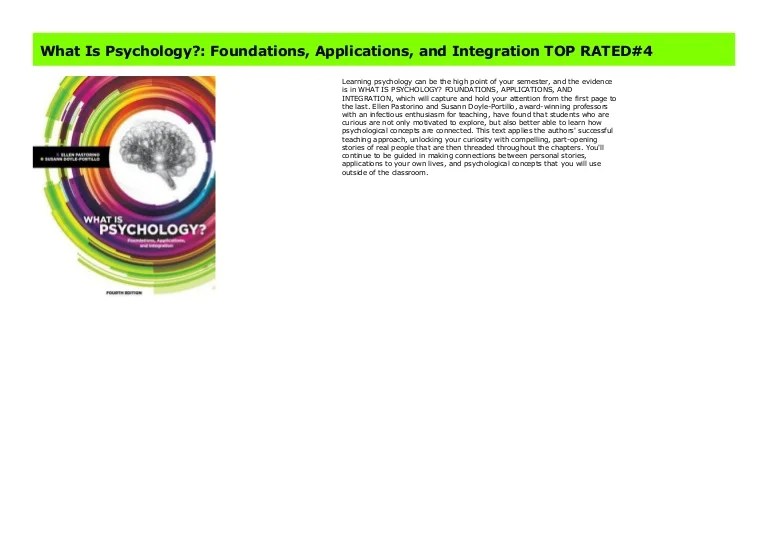What is psychology foundations applications and integration 5th edition pdf – What is Psychology: Foundations, Applications, and Integration, 5th Edition PDF delves into the fascinating realm of psychology, providing readers with a comprehensive understanding of its fundamental concepts, practical applications, and the significance of integrating diverse perspectives. This seminal work offers an in-depth exploration of the discipline, making it an invaluable resource for students, researchers, and practitioners alike.
The text commences by establishing a solid foundation in the core principles of psychology, tracing its historical evolution and examining the major theoretical frameworks that have shaped the field. It then delves into the practical applications of psychology, showcasing its multifaceted utility in addressing real-world challenges across various domains.
1. Psychology Foundations: What Is Psychology Foundations Applications And Integration 5th Edition Pdf
Psychology is the scientific study of the mind and behavior. It seeks to understand the mental processes, emotions, and behaviors of humans and other animals. Key concepts in psychology include perception, learning, memory, motivation, and emotion.
The history of psychology can be traced back to the ancient Greeks, who first began to speculate about the nature of the mind and human behavior. However, it was not until the 19th century that psychology emerged as a distinct scientific discipline, with the establishment of the first psychology laboratory in Leipzig, Germany, by Wilhelm Wundt in 1879.
Major Perspectives in Psychology, What is psychology foundations applications and integration 5th edition pdf
- Biological perspective: This perspective focuses on the biological basis of behavior, including the role of genes, brain structure, and neurotransmitters.
- Cognitive perspective: This perspective focuses on the mental processes involved in thinking, learning, and memory.
- Behavioral perspective: This perspective focuses on the observable behaviors of individuals and how they are shaped by their environment.
- Humanistic perspective: This perspective focuses on the unique qualities of humans, such as free will, creativity, and the pursuit of self-actualization.
- Psychodynamic perspective: This perspective focuses on the unconscious mind and the role it plays in shaping behavior.
2. Psychology Applications
Psychology is applied in a wide variety of fields, including:
- Clinical psychology: This field focuses on the diagnosis and treatment of mental disorders.
- Educational psychology: This field focuses on the learning process and how to improve teaching methods.
- Industrial-organizational psychology: This field focuses on the application of psychology to the workplace, including employee selection, training, and motivation.
- Forensic psychology: This field focuses on the application of psychology to the legal system, including criminal profiling and witness testimony.
- Health psychology: This field focuses on the relationship between psychology and physical health, including the effects of stress on the body.
Psychology is used to address a wide range of real-world problems, such as:
- Mental illness: Psychology is used to diagnose and treat mental disorders, such as depression, anxiety, and schizophrenia.
- Educational problems: Psychology is used to improve teaching methods and help students learn more effectively.
- Workplace problems: Psychology is used to improve employee morale, productivity, and safety.
- Legal problems: Psychology is used to help solve crimes, evaluate witnesses, and provide expert testimony.
- Health problems: Psychology is used to help people manage stress, improve their diet and exercise habits, and cope with chronic illnesses.
3. Psychology Integration
Integrating different perspectives in psychology is important for a comprehensive understanding of the mind and behavior. Each perspective offers a unique lens through which to view psychological phenomena, and by combining these perspectives, we can gain a more complete picture.
However, integrating different perspectives can also be challenging. The different perspectives often use different methods and assumptions, and it can be difficult to find common ground. Additionally, some perspectives may be incompatible with each other.
Despite the challenges, integrating different perspectives in psychology can be beneficial. By combining the strengths of different perspectives, we can develop a more comprehensive understanding of the mind and behavior. Additionally, integration can help to break down the barriers between different subfields of psychology and foster a more collaborative research environment.
4. 5th Edition Features

The 5th edition of the textbook has been updated and improved in a number of ways, including:
- New content: The 5th edition includes new content on a variety of topics, including the latest research on the brain and behavior, the use of technology in psychology, and the application of psychology to real-world problems.
- Revised content: The 5th edition has been revised to reflect the latest research and thinking in psychology. This includes updates to the chapters on sensation and perception, learning, memory, motivation, and emotion.
- New pedagogy: The 5th edition includes a number of new pedagogical features, such as learning objectives, key terms, and review questions. These features are designed to help students learn and retain the material.
Questions Often Asked
What are the key features of the 5th edition of the textbook?
The 5th edition features updated content, revised chapters, and the inclusion of new research and case studies, ensuring that readers have access to the most current information in the field.
How is psychology applied in various fields?
Psychology finds application in diverse fields such as education, healthcare, business, and law enforcement, helping professionals understand and address human behavior and mental processes in specific contexts.
What are the benefits of integrating different perspectives in psychology?
Integrating different perspectives allows for a more comprehensive understanding of human behavior, as it incorporates insights from various theoretical frameworks and methodologies.